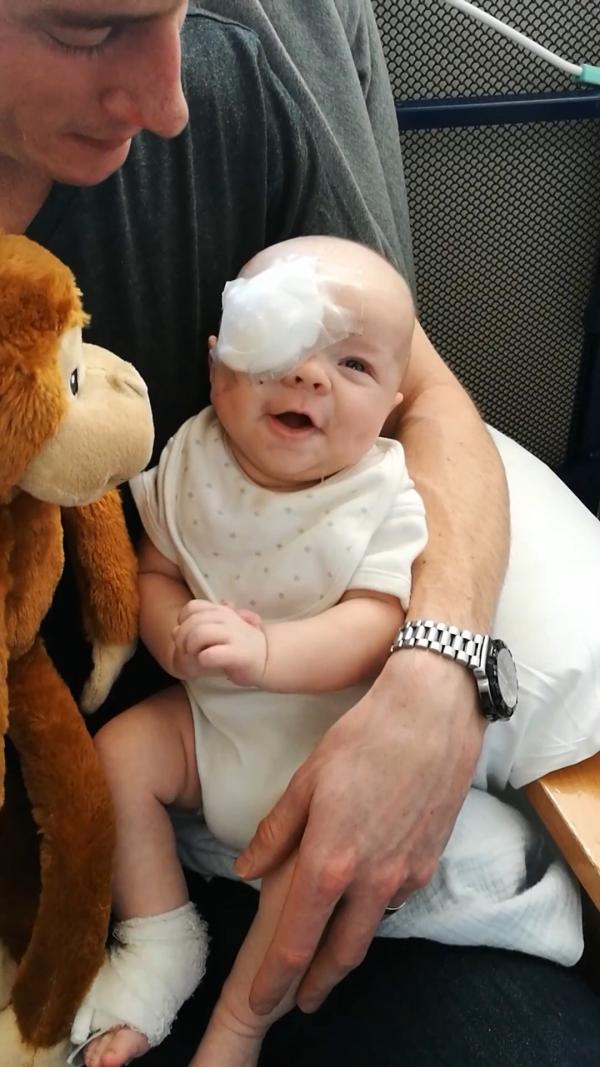
In September 2017, first-time parent Charlene Koekemoer gave birth to her son Taigh and was soaking up the experience. But, after a few weeks, she noticed something was wrong with her son.
“At nine-weeks-old, Taigh got a fever that went down, but then it went back up again and I didn’t know what to do, so I took him to hospital,” says Charlene. “The triage nurse saw him and then we saw the doctor. The doctor told us the triage nurse said she saw a white mass in his eye.
“I asked, ‘What does that mean?’ He said it seemed like a tumour, and our hearts dropped. Three other doctors were called in to see him, and they said he was fine and sent us home. That was on Sunday. The following Friday I was holding Taigh and my husband was staring at him, and he said, ‘I think I can see what the nurse was talking about’. Then he held him the same way I held him, and I could see it. My heart dropped and I knew something was wrong.
“We went to the out-of-hours doctor the next day, they wrote a referral letter to the hospital after insisting on one. When I got home I read it and it said, ‘Can you check Taigh's right eye, the mother is worried’. I felt like I was hallucinating and maybe nothing's wrong. By Monday morning, he still wasn’t right, so I went to my GP, told them the situation and they sent us straight to hospital.”

When they got to hospital, Taigh had some tests done and then referred to go under sedation the next day, the doctor suspected that Taigh had an eye cancer called retinoblastoma. Taigh then had to go to a children’s hospital in Birmingham to receive a definitive diagnosis. The young child’s parents, Charlene and Charl, who live in Rush, Dublin, were distraught when they got the news.
“Our lives were turned upside down,” says Charlene. “We just sobbed. For me, cancer meant death. With Taigh being ten weeks old, and me being a first-time mother, it was a huge deal and it felt like I hit rock bottom.
“We went to Birmingham where Taigh was put under with anaesthetic, they gave us his diagnosis and said the best option was to remove his eye because the tumour was over three-quarters of his eye.
“Taigh was the first child in Ireland in over a year who was diagnosed with retinoblastoma, so we had to go to the hospital in Birmingham because they have a specialist department for it.”
Taigh’s eye was removed in Birmingham and was replaced with a prosthetic. He returned to the hospital in Birmingham on a monthly basis for a year, until staff were happy enough with his progress to transfer his treatment to Temple Street Hospital in Dublin.
“After a year, we were sent back to Temple Street for his regular checkups. It went from going every three months, to every four months, and now it’s every six months, and he’s in a good place.”
Now aged seven, Taigh is a sensitive and thoughtful child who enjoys playing with his little sister, Faye, and has adapted to having a prosthetic eye.
“He’s learning to take out his prosthetic eye, by himself,” says Charlene. “He’s a very cautious child and things like his depth perception are different. Otherwise, he’s good. We explained to him before that his eye was sick and that’s why they had to take it away. When he was a bit older, we told him that he had cancer in his eye and that’s why it was taken out."
Just before he turned two, Taigh attended his first Barretstown camp. Taigh and his family have since gone to three more Barretstown camps, which are now run by the Irish Cancer Society for children living with cancer and their families. Charlene says the experience of her first ever camp was deeply emotional for her.
“At the end of the camp, all of the volunteers lined up and dress in characters and cheer for the kids. It’s such a wonderful thing for them to do for kids who are suffering, and for the families and parents. It’s truly special. It takes away all your worries. Everybody there is having fun, everybody is talking to everybody, and no one passes judgement. Unless you meet other people who have gone through similar situations, no one else really understands.”
As for advice for other parents, Charlene says they should follow their gut instinct and ask questions. “I always tell everyone I know that has a child, that you should trust your gut instinct. Don’t be afraid to ask, don’t be afraid to question things. I feel like a lot of people go, ‘Oh, it’s a first-time mother, they don’t know what they’re doing’. I don’t think that’s fair. Don’t worry about what the doctors think of you, go with your gut – don’t ever feel that you’re overexaggerating, this is your child.”

